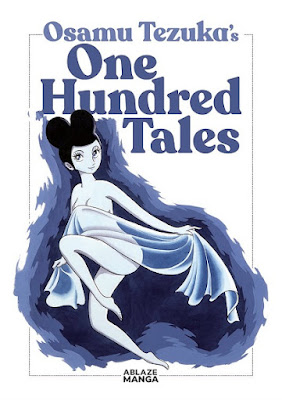There were not a lot of heroic samurai accounts during the Feudal era—and Inchirui Hanri was not about to be the exception. He is no Minamoto no Yoshitsune, so when he is instructed to commit hara-kiri because of a clan scandal (for which he was blameless), Hanri balks and disgraces himself. To save his skin, he sells his soul to a witch in the late great manga writer-artist Osamu Tezuka’s One Hundred Tales, his fantastical samurai riff on Faust, which releases today.
Just when all seems lost, Sudama, a shape-shifting Yokai-witch offers to save Hanri and grant him three wishes, all for the amazingly low price of his immortal soul. Being a greedy coward, Hanri immediately agrees, but he subsequently displays more character than Sudama expected. She alters his appearance, putting him on the road to wealth and power, under his new identity, Fuwa Usoto. However, he also wished for the most beautiful woman in the world. Much to Sudama’s annoyance, Usoto/Hanri decides an alluring fox spirit living in a forbidden realm must be his mate.
A wish is a wish, so Sudama reluctantly agrees to help him. She is especially put-out by it, because she is starting to fall for Usoto herself. He is a real pain to deal with, but he also starts to feel something for her too, even though that could be his downfall. Once he starts feeling satisfaction in his new life, the contract is fulfilled and his soul reverts to Sudama.
It is easy to see how Tezuka drew inspiration from Faust, but One Hundred Tales is far from a beat-by-beat translation and transposition from 18th Century Germany to the age of the Samurai. It is also surprisingly hip and postmodern in ways that seem decades ahead of its time. Tezuka regularly parodies Japanese pop culture and other manga and comic series, including his own Astro Boy. Even manga newcomers will immediately get the Popeye send-up.
Tezuka also regularly has Usoto/Hanri break the fourth wall, addressing readers in a self-referential manner. Some of the jokes will only really land for readers well steeped in manga history. Nevertheless, the subversive zeitgeistiness still comes through.
Despite the wild telling of the tale, the ironic tragedy of Sudama’s yearning for Usoto is potently romantic and quite in keeping with grand epics of the era. Of course, Tezuka’s traditional black-and-white manga art is clean and striking. It all makes for a rewarding manga experience, except for the new publisher’s preface, which offers a cringe-inducing “trigger warning” for Tezuka’s caricatured depictions of non-Japanese characters. Most readers will be hard pressed to find any such figures in One Hundred Tales, so they really should have skipped the boilerplate.
Regardless, if a reader were choosing their first manga, anything by Tezuka would be a solid choice, definitely including One Hundred Tales. Tezuka diehards might have tracked down old import editions, but it is nice to have it readily available now for the rest of us. Highly recommended as samurai spoof that feels surprisingly contemporary but still very Japanese, One Hundred Tales is now on-sale wherever books and manga are sold.

